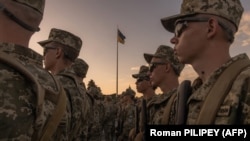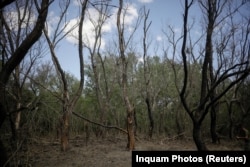Ukraine's counteroffensive against Russian forces will continue in the coming months, regardless of inclement weather when fighting would be harder to conduct, Ukrainian intelligence chief Kyrylo Budanov said Saturday.
"Combat actions will continue in one way or another. In the cold, wet and mud, it is more difficult to fight. Fighting will continue. The counteroffensive will continue," Budanov said.
Ukraine's much-vaunted counteroffensive has seen some success in the south, where Ukrainian forces have retaken a dozen villages over the past three months.
Ukraine's armed forces are making "gradual tactical advances" against Russia's defensive line east of the town of Robotyne, the British Defense Ministry said Saturday in its daily intelligence update on Russia's invasion of Ukraine.
But Ukraine's military operation has been slower than anticipated because of hurdles that include vast minefields and heavily entrenched Russian forces.
Budanov's comments, made during a news conference in Kyiv, indicate Ukraine does not intend to halt its push when the weather turns harsher later this year.
The slow progress of the counteroffensive has sparked concerns among Kyiv's supporters that the West could face an uphill battle to maintain its support and the military aid needed to keep Ukraine battling at the same intensity level.
Ukraine's advances in the southeastern Zaporizhzhia region, now centered around the villages of Robotyne and Verbove, are seen as a crucial part of an operation that seeks to split Russia's occupying forces in half in the south but remains far from that goal.
"Our counteroffensive is happening in several directions," Budanov said, acknowledging that progress had been slower than he wanted and describing the situation as difficult.
Apart from the huge concentration of Russian mines, he identified the large number of small Russian "kamikadze" drones as a key factor in slowing Ukraine's progress so far.
Russian air defense says it shot down three Ukrainian drones over Crimea on Saturday, one in the northwest and two in the west of the peninsula, Sergei Aksyonov, the Russian-installed head of the local administration, said on a post on Telegram.
Reuters could not verify the claims, and there were no immediate reports of damage or casualties.
Drone debris in Romania
The Romanian defense ministry said Saturday that new fragments of a drone, like those used by Russia, were found on its territory, indicating a breach of Romania's airspace.
"The identification by Romanian authorities on Romanian territory near the border with Ukraine of new drone fragments ... indicates an unacceptable breach occurred of the air space of Romania, a NATO member, with real risks to the security of Romanian citizens in the area," Romanian President Klaus Iohannis said in a statement.
Iohannis said he informed NATO Secretary General Jens Stoltenberg of the drone — the second to crash in Romanian territory this week — and that Stoltenberg reiterated the alliance's complete solidarity with Romania.
Since July, when Moscow abandoned the Black Sea grain deal, Ukraine has been shipping grain from its river ports across the Danube from Romania. And Russia has repeatedly struck those Ukrainian river ports.
These attacks, just hundreds of meters from the Romanian border, have increased security risks for NATO, whose members have a mutual defense commitment.
The U.S. State Department said earlier this week it would rotate additional U.S. F-16 fighter jets to bolster NATO's air policing mission in Romania.
G20 summit
The leaders of the world's 20 wealthiest countries adopted a consensus declaration Saturday at the G20 summit, calling on all states to refrain from the use of force to seize territory but stopped short of condemning Russia for its war on Ukraine.
Despite the consensus declaration, the group remains deeply divided over the war. Western nations were pushing for a strong denunciation of Russia in the Leaders' Declaration, while other countries demanded a focus on broader economic issues.
On the war in Ukraine, the declaration says that all states must refrain from threats or use of force to seek territorial acquisition against territorial integrity and sovereignty or political independence of any state. It also called the use or threat of use of nuclear weapons "inadmissible" and urged for peaceful resolution of conflicts using diplomacy and dialog.
The G20 noted "different views and assessments of the situation," regarding the war in Ukraine.
They called on Russia and Ukraine to ensure immediate and unimpeded deliveries of grain, foodstuffs, and fertilizers from Russia and Ukraine for the sake of global food and energy security and asked for the end of military destruction or other attacks on relevant infrastructure.
The White House hailed this year's G20 summit as a success, saying Saturday the final communique contains "consequential paragraphs" on Russia's invasion of Ukraine – despite the notable omission of the word "Russia" in those paragraphs, which drew sharp criticism from Ukraine's government.
Washington's argument for supporting Ukraine hinged on the significant economic consequences of the conflict, the White House told VOA.
"The war in Ukraine has put a huge strain on lower- and middle-income countries when it comes to food security, energy security, inflationary pressure – you can't discount the effect that Mr. Putin's war has had on the global economy," John Kirby, the National Security Council coordinator, told VOA on the summit's sidelines in New Delhi.
The New Delhi declaration did not explicitly condemn Russia's devastating war against Ukraine, as was the case at the G20 summit last year.
Russian G20 representative Svetlana Lukash told journalists in New Delhi the joint declaration reached at the summit was "balanced" and welcomed by Moscow.
The top leaders of Russia and China were absent from the summit but were represented by their envoys.
VOA White House Correspondent Anita Powell contributed to this report from New Delhi. Some information was provided by The Associated Press, Agence France-Presse and Reuters.







